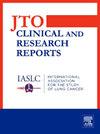CD5 Immunoreactivity Is Associated With Longer Overall Survival in Thymic Carcinoma: A Brief Report
IF 3.5
Q2 ONCOLOGY
引用次数: 0
Abstract
Thymic carcinomas are a heterogeneous group of potentially aggressive malignancies. We aimed to determine the prognostic significance of CD5, CD117, EZH2, POU2F3, BAP1, and MTAP immunohistochemical staining in thymic carcinomas. Immunohistochemistry was performed on 36 thymic carcinomas from patients with retrospectively collected survival data. Thirteen cases (36%) had CD5 staining in 50% or more tumor cells, considered positive staining. Positive CD5 immunohistochemical staining was significantly associated with longer overall survival (hazard ratio = 0.18, 95% confidence interval: 0.03–0.63, p = 0.005). Three-year overall survival was 48% (95% confidence interval: 27%–70%) for CD5 negative cases, and 100% for CD5 positive cases. Positive CD5 staining remained significantly associated with overall survival after adjusting for neoadjuvant treatment, M-stage, or incomplete resection (p = 0.01). The remaining immunohistochemical markers were not significantly associated with overall survival. Our study supports the notion that CD5 immunohistochemistry may have utility as a novel prognostic marker for thymic carcinoma.
CD5免疫反应性与胸腺癌患者更长的总生存期相关:一份简短报告
胸腺癌是一类异质性的潜在侵袭性恶性肿瘤。我们旨在确定CD5、CD117、EZH2、POU2F3、BAP1和MTAP免疫组化染色在胸腺癌中的预后意义。研究人员对36例胸腺癌患者进行了免疫组化,并回顾性收集了患者的生存数据。13例(36%)肿瘤细胞中有50%或以上出现CD5染色,被认为是阳性染色。CD5 免疫组化染色阳性与较长的总生存期显著相关(危险比 = 0.18,95% 置信区间:0.03-0.63,P = 0.005)。CD5阴性病例的三年总生存率为48%(95%置信区间:27%-70%),CD5阳性病例的三年总生存率为100%。在调整了新辅助治疗、M期或不完全切除等因素后,CD5染色阳性仍与总生存率显著相关(p = 0.01)。其余免疫组化标记物与总生存率无明显相关性。我们的研究支持这样一种观点,即 CD5 免疫组化可作为胸腺癌的新型预后标志物。
本文章由计算机程序翻译,如有差异,请以英文原文为准。
求助全文
约1分钟内获得全文
求助全文
来源期刊

JTO Clinical and Research Reports
Medicine-Oncology
CiteScore
4.20
自引率
0.00%
发文量
145
审稿时长
19 weeks
 求助内容:
求助内容: 应助结果提醒方式:
应助结果提醒方式:


